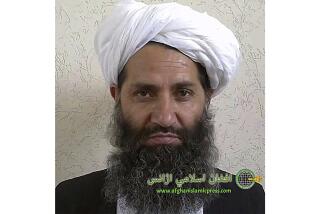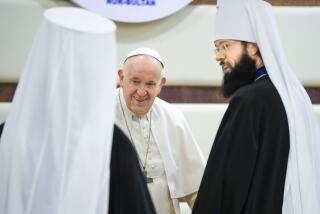Russian Muslim Calls for Jihad
- Share via
MOSCOW — One of Russia’s most prominent Muslim leaders, supreme mufti Talgat Tadzhuddin, called Thursday for jihad, or holy war, against the United States.
Speaking at a rally in the heavily Muslim city of Ufa, about 750 miles east of Moscow near the Ural Mountains, Tadzhuddin left it unclear exactly what the proposed jihad would entail. His comments were immediately attacked by a rival Islamic organization, but they reflected widespread anger among Russia’s 20 million Muslims over the U.S.-led war against Iraq.
“Russian Muslims have levers of efficient influence on the United States. For instance, we will raise donations for a fund and use the money to buy armaments for fighting America and food for the people of Iraq,” said Tadzhuddin, as quoted by the Russian news agency Interfax.
Tadzhuddin said the organization he heads, the Central Islamic Department of Muslims of Holy Russia, had declared jihad. But the statement seemed to flummox even his own group.
“It was made very unexpectedly -- right at the rally, in the middle of the crowd,” Svetlana Zakorko, press spokeswoman for Tadzhuddin, said by phone from Ufa, capital of the Bashkir republic. “Nothing like this had been prepared for in advance. There were no papers or even draft versions of the statement. It was made on the spur of the moment.” She said that the statement would be discussed Saturday at a meeting in Moscow of Muslim leaders from the former Soviet Union and that further information would be available only after the meeting.
Akhmet Khalitov, chairman of the Union of Russia’s Muslims, said that as supreme mufti, Tadzhuddin is technically the country’s top Islamic leader but in practice not necessarily the most influential. “Talgat Tadzhuddin had the right to declare jihad, but only on behalf of his own mosque,” Khalitov said. The “mosque is a huge and widely respected mosque that unites many people in Bashkiria. But all his decisions apply only to his flock and nobody else.”
Still, Khalitov predicted that the declaration “will not be ignored by Muslims who go to other mosques” and that it “may fall on very fertile and well-plowed soil. Today, the Muslim world is like a huge keg of gunpowder. The scale of the jihad now depends on the condition this powder is in. It is dry in some places and a bit damper in others. But the match has already been lit.”
The call for holy war was criticized by other Muslim leaders, including Ravil Gainutdin, Moscow-based head of the Council of Muftis of Russia, a group that rivals Tadzhuddin’s. “The Muslims of Russia do not declare a jihad,” Gainutdin said. “We must be realistic. It is enough that Iraqi leader Saddam Hussein has announced a jihad against America.”
Sheik Nafitulla Ashirov, council co-chairman, denounced Tadzhuddin. The call for jihad “has not been agreed [upon] with a single Muslim organization in Russia” and is “a populist trick aimed at raising Tadzhuddin’s personal popularity rating with the Muslims of Russia using the tragedy that is going on in Iraq these days,” he said.
Russian authorities staked out middle ground. “If it is a matter of moral and material support for people of the same belief, there is nothing reprehensible about it,” said Sergei Nikulin of the Justice Ministry. “However, any attempts to recruit mercenaries or buy armaments and ship them to Iraq would be subject to criminal investigation.”
Ashirov predicted that the call to holy war would have no great practical effects: “It is an irresponsible statement that discredits the role of Muslim organizations in Russia.... We are deeply convinced that the Muslims of Russia will by no means fall for this provocation.”
Khalitov disputed that view.
“Where Muslim communities are more radical, they will immediately start signing up as volunteers to go to Iraq to fight and will collect money,” he said. “In places where people are calmer, the reaction will not be that hot. But in any case, the threat of a jihad among Russian Muslims is very real, more real than someone may think.”
*
Alexei V. Kuznetsov of The Times’ Moscow Bureau contributed to this report.
More to Read
Sign up for Essential California
The most important California stories and recommendations in your inbox every morning.
You may occasionally receive promotional content from the Los Angeles Times.













